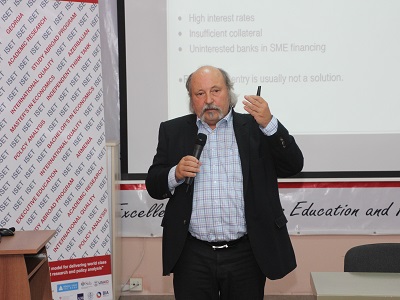- Details
At the initiative of the Government of Georgia, a new model of corporate taxation was introduced in 2017. The so-called Estonian Model of Corporate Income Tax (CIT) reform envisaged a transition to a model wherein enterprises would only be taxed on profit distribution. The overall objective of the reform was to accelerate the country's economic growth through the elimination of retained earnings tax, as well as to create a conducive environment for business start-ups and improve tax administration. According to our estimates, it costs the state budget of Georgia more than 1bn Georgian Lari of forgone profit taxes.
The ISET Policy Institute has been engaged with the Budget and Finance Committee of the Parliament and PwC in the ex-post Regulatory Impact Assessment (RIA) of the CIT reform, commissioned by the GIZ. The objective of the ex-post RIA was to provide interim assessment on the reform implementation; making sure the reform is on the right track achieving its defined objectives. On October 24 2019, a team of ISET, government and PwC researchers working on the project presented their findings at a high-level meeting attended by the Chair of Parliament, Mr. Archil Talakvadze, and the Chair of Budget and Finance Committee of the Parliament, Mr. Irakli Kovzanadze, as well as other guests.
- Details
Independent entrepreneurship is one of the main drivers of economic development and often manifests itself in the form of small and medium enterprises (SMEs). These start-ups trigger innovation, boost productivity and bring about structural change.
As Prof. Dr. Hansjörg Herr explained, Germany has been able to reap the benefits of this due to a multitude of internal factors. Its local banking system, for instance, is not profit-oriented and consists of savings banks, which is more accessible for entrepreneurs. The country’s vocational education system, too, plays a part, with its split system of teaching both practical skills and theoretical knowledge (in contrast to the more academic education practices of other Western countries). In addition, the government is very supportive of SMEs, as is the government’s development bank, the KfW.












